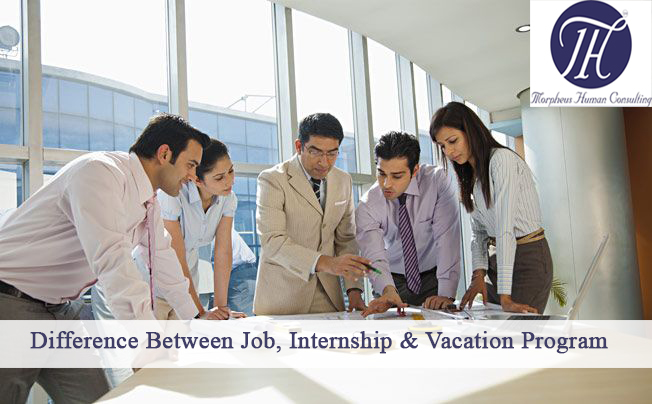Difference Between A Job, Internship And Vacation Program
Although you will be doing similar tasks in graduate jobs, internships and summer vacation programs, they are all quite different to one another. Through them you are able to gain and develop your skills as well as get experience that would be useful for the prospects of your career. Here is some information that will help you understand the difference between graduate jobs, internships and vacation programs.
Graduate Jobs
Graduate jobs are very specific in which they are jobs offered by graduate recruiters that targets graduates and a career path where the entry level qualifications is a degree. Some may mistake graduate jobs being a job that graduates do, however that is incorrect as some graduates work in a place that do not require a degree, which is not what you would call a graduate job. There are four different types of graduate jobs:
1.Traditional
Traditional graduate jobs are jobs that apply for established professions in which a degree is required for entry. It would not be possible to get a graduate job without a degree. Examples include professions in Law, Medicine, and Architecture.
2.Modern
Modern graduate jobs are jobs that are new in the professional fields including IT, Management, and Journalism. To have a degree also became a point of entry for these professions and became a new set of graduate jobs. These jobs often have more responsibility in strategies and interaction than traditional graduate jobs
3.New
The jobs categorized in the new graduate jobs are jobs that may have not required a degree in the past such as Marketing and Sales, Management Accounting, Welfare, and Physiotherapy. These jobs would require a higher level of strategic responsibility and the ability to interact with others rather than being an expert in a topic.
4.Niche
Niche graduate jobs are related to industries or professions where majority of the workers are non-graduates. More and more niche positions or areas within the field look for those with a degree and can be found in areas such as Sports Management, Retail Management, and Logistics
Some graduates also choose not to take a graduate job and start working in ‘non-graduate jobs’ instead for reasons such as:
- Graduates may want to take time to travel and acquire further qualifications
- Some graduates would start their work with a non-graduate and progress into a graduate role due to employment sectors not offering graduate entry points
- Their financial status or other pressures could lead graduates to take non-graduate jobs first after leaving university
- Some graduates prefer other forms of employment and never seek for a graduate career path.
Internships
An internship is different to a job or graduate job as they are targeted for undergraduates or students, usually those in their penultimate year, that are looking for work experience related to their studies. Internships are offered by employers to potential employees to work for a limited period of time. These internships can be part-time (during a university semester) or full-time (during summer or winter holidays) and can last between one week and 12 months and can be paid or unpaid.
Paid Internships
Most internships are paid internships, more commonly in field such as Engineering, Legal, Business (especially Accounting and Finance), Technology, Medical, Science and Advertising.
Unpaid Internships
There are also unpaid internships which are mostly found in employers with a high profession such as Media (radio, television, print), Politics and non-profit organisations
Internships offer students valuable experience in the industry related to their field of study. This experience allows students to be able to apply what they have studied into the real world. Internships also help students create a network of contacts that could be useful in the future, gain credit, and also determine if they are interested in an area of the industry.
Summer Vacation Program
A vacation program is similar to an internship, which can be also called a placement. However a summer vacation program takes place during student vacations and usually last between 8-12 weeks between the months of November and February. Recruitment for summer vacation programs start around July to September and target students who are in the penultimate year. The difference between a vacation program and an internship is that in vacation programs you will be paid while internships there are still chances that you’ll be taking an unpaid internship.
Reasons for students to go take a summer vacation program is similar to taking an internship:
- It is a great way for them to obtain further experience and skills while being paid
- You get the opportunity to work on projects individually or within groups
- Allows employers to observe what you can do and your talent and chances are you may be able to get an offer to work there in the future for a graduate job
Link: Link to source
